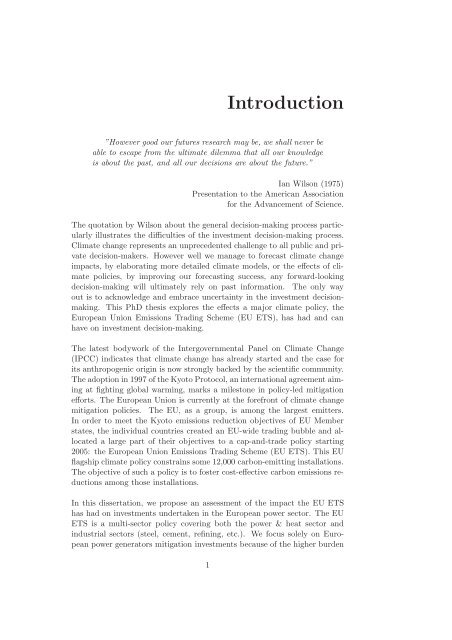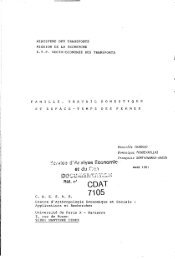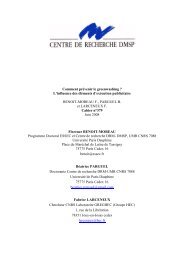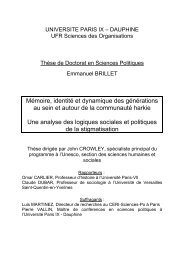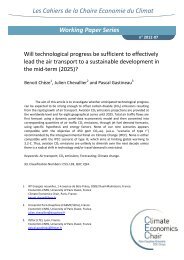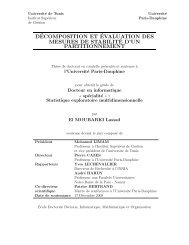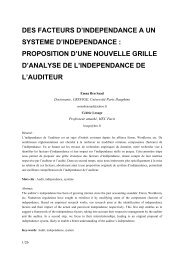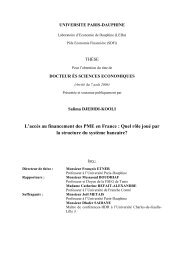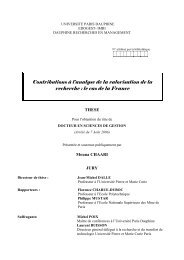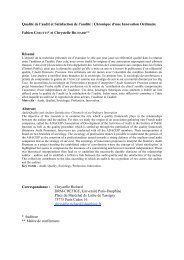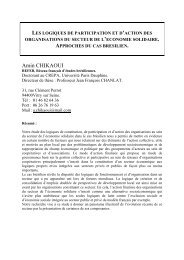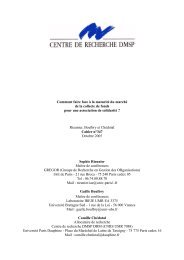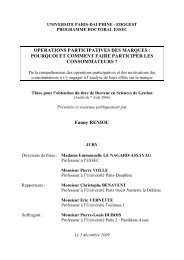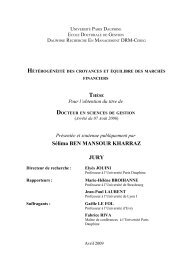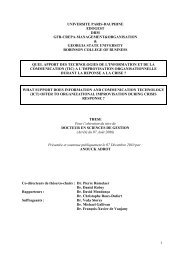TH`ESE Docteur de l'Université Paris-Dauphine Morgan HERVÉ ...
TH`ESE Docteur de l'Université Paris-Dauphine Morgan HERVÉ ...
TH`ESE Docteur de l'Université Paris-Dauphine Morgan HERVÉ ...
Create successful ePaper yourself
Turn your PDF publications into a flip-book with our unique Google optimized e-Paper software.
Introduction<br />
”However good our futures research may be, we shall never be<br />
able to escape from the ultimate dilemma that all our knowledge<br />
is about the past, and all our <strong>de</strong>cisions are about the future.”<br />
Ian Wilson (1975)<br />
Presentation to the American Association<br />
for the Advancement of Science.<br />
The quotation by Wilson about the general <strong>de</strong>cision-making process particularly<br />
illustrates the difficulties of the investment <strong>de</strong>cision-making process.<br />
Climate change represents an unprece<strong>de</strong>nted challenge to all public and private<br />
<strong>de</strong>cision-makers. However well we manage to forecast climate change<br />
impacts, by elaborating more <strong>de</strong>tailed climate mo<strong>de</strong>ls, or the effects of climate<br />
policies, by improving our forecasting success, any forward-looking<br />
<strong>de</strong>cision-making will ultimately rely on past information. The only way<br />
out is to acknowledge and embrace uncertainty in the investment <strong>de</strong>cisionmaking.<br />
This PhD thesis explores the effects a major climate policy, the<br />
European Union Emissions Trading Scheme (EU ETS), has had and can<br />
have on investment <strong>de</strong>cision-making.<br />
The latest bodywork of the Intergovernmental Panel on Climate Change<br />
(IPCC) indicates that climate change has already started and the case for<br />
its anthropogenic origin is now strongly backed by the scientific community.<br />
The adoption in 1997 of the Kyoto Protocol, an international agreement aiming<br />
at fighting global warming, marks a milestone in policy-led mitigation<br />
efforts. The European Union is currently at the forefront of climate change<br />
mitigation policies. The EU, as a group, is among the largest emitters.<br />
In or<strong>de</strong>r to meet the Kyoto emissions reduction objectives of EU Member<br />
states, the individual countries created an EU-wi<strong>de</strong> trading bubble and allocated<br />
a large part of their objectives to a cap-and-tra<strong>de</strong> policy starting<br />
2005: the European Union Emissions Trading Scheme (EU ETS). This EU<br />
flagship climate policy constrains some 12,000 carbon-emitting installations.<br />
The objective of such a policy is to foster cost-effective carbon emissions reductions<br />
among those installations.<br />
In this dissertation, we propose an assessment of the impact the EU ETS<br />
has had on investments un<strong>de</strong>rtaken in the European power sector. The EU<br />
ETS is a multi-sector policy covering both the power & heat sector and<br />
industrial sectors (steel, cement, refining, etc.). We focus solely on European<br />
power generators mitigation investments because of the higher bur<strong>de</strong>n<br />
1


